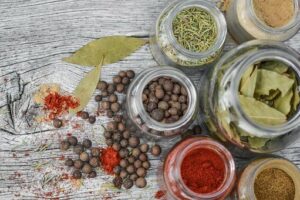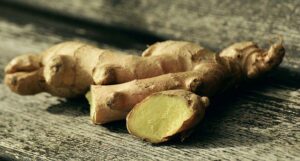Historically herbs and spices have enjoyed a rich tradition of use for their flavour-enhancement characteristics and for their medicinal properties. The rising prevalence of chronic diseases worldwide and the corresponding rise in health care costs is propelling interest among researchers and the public for these food-related items for multiple health benefits, including a reduction in cancer risk and modification of tumour behaviour. A growing body of epidemiological and preclinical evidence points to culinary herbs and spices as minor dietary constituents with multiple anticancer characteristics.
This review focuses on the anti-microbial, antioxidant, and anti-tumorigenic properties of herbs and spices, their ability to influence carcinogen bioactivation, and likely anticancer contributions. While culinary herbs and spices present intriguing possibilities for health promotion, more complete information is needed about the actual exposures to dietary components that are needed to bring about a response and the molecular target(s) for specific herbs and spices. Only after this information is obtained will it be possible to define appropriate intervention strategies to achieve maximum benefits from herbs and spices without eliciting ill consequences.

Most chefs and foodies agree that adding a dash of this or pinch of that can transform an ordinary dish into pure magic. But what many culinary experts may not know is the zing that makes your supper sing can also help to prevent cancer. Scientists have found that certain foods, including some herbs and spices, contain phytochemicals, which can affect our bodies biologically. Through their ability to stimulate the immune system, phytochemicals may aid in keeping cancer at bay. Here are six ways to spice up your food and keep you in good health. Now, please pass the pepper!
The spice turmeric contains curcumin, which gives curry powder its yellow colour. Curcumin is one of the most powerful anti-inflammatories identified to this day, curcumin can work against these blood vessels and essentially choke the cancer cells to death. Mixing turmeric with black pepper and olive oil can activate curcumin’s power. With its mild and pleasant flavour, turmeric can be used as a dry rub on chicken or even vegetables.
Along with onions, shallots, scallions, and leeks, garlic is an allium vegetable that may help prevent cancer, especially in the stomach. Allium vegetables contain organosulfur compounds, the chemical that causes eye-tearing when they’re chopped. Organosulfur has immune-strengthening and anti-carcinogenic qualities. Garlic is a versatile cooking essential. It can be sautéed in a tablespoon of olive oil and served with whole-grain bread, or baked in the oven and then mashed into a spread. It’s delicious added to vegetables and meat dishes.

Another weapon in your kitchen’s cancer prevention arsenal, fresh ginger contains gingerol while dried ginger forms zingerone. Gingerol and zingerone are thought to have antioxidant and anti-inflammatory properties, and therefore may be protective against cancer. Store ginger in the freezer and grate a bit into lentils or rice when cooking. Steeping a few thin slices in hot water for 10 to 15 minutes can create a calming tea that may help with nausea and also decrease cancer risk.
Black pepper contains the active substance piperine, a naturally occurring chemical compound with strong antioxidant properties. A study conducted by scientists at the University of Michigan Comprehensive Cancer and published in the journal Breast Cancer Research and Treatment found pepper along with turmeric — inhibited the growth of cancerous stem cells in breast tumours. However, the spice didn’t destroy healthy cells. Pepper can add flavour to a whole host of dishes, from scrambled eggs to sliced tomatoes to soups and casseroles.
